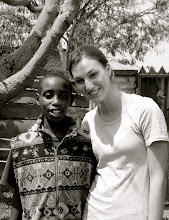

With our survey completed, our group had the opportunity this past week to visit four of RVCP’s programs. Eugene, the coordinator of the Malaria prevention program, took us and the BVDA group to watch one of his sessions at Nyanza Primary School last Wednesday. We pulled up at the school and were immediately greeted by a large group of kids. They circled around us as we greeted them with our limited vocabulary. As we pulled out our cameras, many of the children ran away and a few of the bravest moved closer to examine our pictures and pose. Eugene took us to a classroom where older students (9-14) were seated, diligently waiting for their lesson. First, he administered a quiz on basic Malaria facts and prevention. After the students had finished, they left the room while we graded the quiz. After we finished grading, Eugene passed around a geranium plant and explained that it can be placed outside windows to prevent mosquitoes from coming in the house when screens or netting are not available. He then led us to a house where he demonstrated the proper way to put up a mosquito net. We headed back to the classroom where he handed out notebooks to the students who scored the highest on the quizzes. Meanwhile, Regina, Amanda, and I were interacting with the students who were coming through the windows, anxious to get a better view of all the visitors. Overall, I thought the lesson was incredibly well done, and that Eugene did a good job of making the lesson interactive and interesting for the kids.
On Saturday morning Marta, one of the coordinators of RVCP’s initiatives, took all of the volunteers to visit the orphanage that RVCP sponsors. Although it is called "The Orphanage," the kids only come on Saturdays and most have been adopted or have foster families. The kids at the orphanage were a lot more outgoing than the children at the primary school and they sang and danced for us. After they had finished several songs the staff at the orphanage asked us to sing for them. Not knowing we were going to be asked to perform for 40 primary and secondary students, our group frantically tried to come up with a song that we all knew. Finally, with some apprehension, we decided on the popular “Heads, Shoulders, Knees, and Toes.” Luckily for us, many of the children knew the song and joined in. Afterwards, we were led outside and the children were separated into groups for recess. I joined the group that was playing volleyball with a soccer ball and taught some of the kids how to head the ball, which they found hilarious. Later, we joined groups and played red rover, duck duck goose, and one that was called Amazi (meaning water in Kinyarwanda) that was pretty similar to red light, green light. Initially, I think our group was nervous that we wouldn’t be able to come up with enough games to keep the kids entertained, but by the end everyone was having a blast. Several of the kids took our cameras and sunglasses. They strutted around the yard flashing peace signs and popped collars, displaying sophistication beyond their seven years.
While I was engaged in a very competitive game of duck duck goose, a woman who worked at the orphanage approached me. I recognized her from earlier when I had seen her standing in front of the kids, leading the singing. She had an amazing voice and a contagious smile, and everything about her seemed to radiate happiness. She was incredibly kind to me and despite the language barrier, we managed to converse relatively fluidly. When I told her I only had a couple of days left in Rwanda, she grabbed my arms and laid her head on my shoulder, murmuring, “No, no. You can’t leave yet!” She really wanted me to stay with her but I had to explain that I had a family at home and school I had to return to. She understood my reasoning but made me promise I would come back, which I did. This experience definitely confirmed what I’ve observed so far about many people in Rwanda; people are incredibly warm, interested in forming lasting friendships, and genuinely compassionate and caring.
**In other news, I have developed a serious (but supposedly treatable) addiction to mangos. This condition commonly occurs among Western travelers in Rwanda. So far the symptoms have included withdrawal, inability/unwillingness to consume other foods, and vitamin C overdose. Luckily the number of fatalities due to this condition is very small.



No comments:
Post a Comment